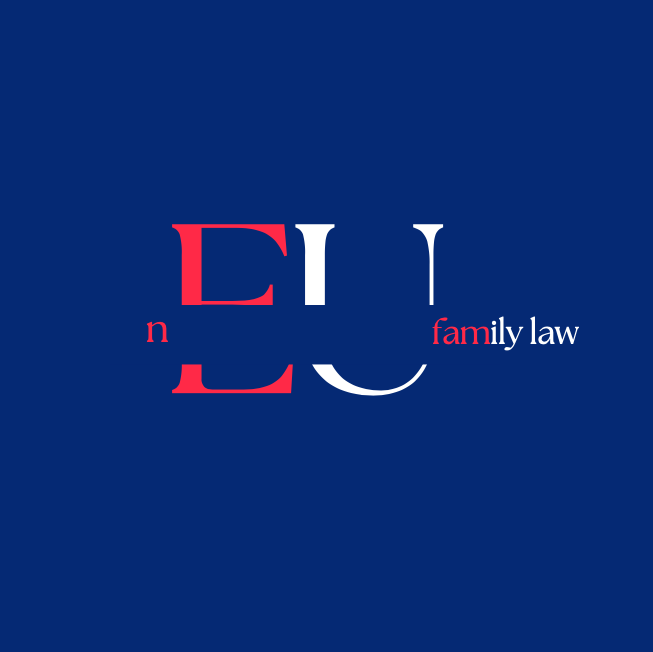By Rafaela Lopes

Article 9 of the Charter of Fundamental Rights of the European Union states that everyone has the right to marry and to found a family. The same idea is also shared by the Treaty of the European Union (article 2º). So, if the European Union (EU) promotes these fundamental values, as well as the prohibition of discrimination based on sexual orientation[1], why is it still so hard for same-sex couples to adopt in the European Union?
Discrimination based on sexual orientation in the EU is still a reality that millions of people have to face every day and, although some efforts were made, there are still people who don’t benefit from the protection they need and are constantly denied of fundamental rights – like marriage and the adoption of children. The European Union has a general lack of competence in family law matters but violations happen every day and the LGBTQ+ community still feels unprotected and misunderstood in their own counties. I believe that more efforts should be made by the EU because their own treaties are not being followed and that creates a horrible precedent in the core of the Union.
In Portugal, the adoption of children by LGBTQ+ couples became a reality in 2016, following the 2/2016 law[2]. As a Portuguese citizen, I know that the adoption process is very slow (even for straight couples) – in some cases, it takes up to three years[3] or more for couples (or single individuals) before being able to adopt. This is because of the intense process of meetings, psychological evaluations and classes where the potential adopter/s learn how to take care of the children and how to deal with certain cases of possible trauma (especially with older children). I understand that it is essential to evaluate the people who will adopt because of the necessity to hold the children’s education and well-being in the best regards; however, I also consider that 3 years is a really long time and a lot of people withdraw from the process because of its morosity and complexity – note that in Portugal the average adopter/s are people aged from 35 to 45 years old[4].
Adding to this – oh so slow – situation, the LGBTQ+ couples have to face another obstacle: in 2019, the people in charge of the adoption processes still had no training or lessons in how to deal with these cases. At the time, ILGA Portugal executive director, Marta Ramos, stated that those professionals needed more information on how to deal correctly with these couples in order to avoid situations of structural discrimination[5]. It took six years after the legislative adoption until the social security technical staff started to receive the right training about the subject matter. So, during six years hundreds (or thousands) of people couldn’t deal properly with the needs and wants of same-sex couples (even if the intention was good).
The Social Security Institute in Portugal does not state how many LGBTQ+ couples adopted to the date – because doing that would be derogatory – but in 2021 an investigation found out that at least sixteen same-sex couples were able to adopt (which is not that bad considering the timely process and lack of preparation of the technical staff who deals with those cases)[6]. It is important to notice that, despite everything stated before, ILGA Portugal never received a complaint with regards to discriminatory behavior during the adoption process[7].
But, what about the European Union?
Some Member-States like The Netherlands, Spain, Belgium and Austria allow the adoption by same-sex couples. Since 1999, the EU acquired competence to act in case of discrimination based on sexual orientation[8], however, they still don´t have competence regarding family law matters. So, despite the support that the EU gives to the LGBTQ+ community, for now, is impossible to do more and actually legalize the same-sex adoption in all Member-States.
Last year emerged a proposal for a Council regulation about the recognition of parenthood between Member-States, which means that, once parenthood has been established in a Member State, it is recognized in all other Member States. This is proposal is extremely important because it will allow the protection of children in cross-border situations within the EU because the main goal is to harmonize some rules in order to end with the conflict of legislation and to make it easier to recognize the parenthood status of the child in order to guarantee the protection of the private and family life. It is important to state that this proposal includes the recognition of the parenthood of children with two same-sex parents. This proposal underlines in the scope of article 81(3) TFEU, so the EU can go forward with this proposal because the Member States still have exclusive competence to regulate matters of substantive family law[9].
In 2020, the EU developed a strategy in order to promote the equality of treatment of LGBTQ+ people in the EU[10]. They recognize that, although the majority of Member-States have legislation that supports rainbow families, the eventual move of those families to Member-States where those legislations are not in force, can create the separation of the families (which is especially damaging to adopted children whom might have trauma with this kind of subject matter, contributing to the deterioration of their own mental health).
Throughout the years, the EU has been given steps to create a more equal space where every EU citizen can be safe no matter their sexual orientation[11]. In 2008, the European Court of Human Rights (ECHR) stated that the French argument that blocked a lesbian woman to adopt violated the art. 14º and 8º of the Charter[12]. The Court also stated that excluding the possibility of children to be adopted by same sex couples (or single LGBTQ+ people) violates human rights and that States don’t have any kind of legitimacy to stop children adoption only because of the adopter/s´ sexual orientation. In 2021, the Court of Justice of the European Union ruled that a child and their same-sex parents should be recognized as a family which means that they would have free movement in all Member-States[13].
Both of these decisions, helped to create a solid foundation to promote equal rights for everyone and the protection of rainbow families in the European Union. However, some Member-States still don’t promote these fundamental values. As I stated before, family law matters are the competence of the Member-States and that creates a huge gap between them. For example, in 2021, Poland banned same-sex couples to adopt children (even as single parents). Despite the critics of the EU, this measure is still in force[14]. So, it is clear that there is a lot of work to do.
Contrary to what happens in the social security services in Portugal, and according to my research, the training of technical staff when it comes to adoption is, generally, not a problem. However, the EU can promote more training to social security services to deal with this subject, following the example given in police services, courts and health services[15].
In conclusion, there is still a lot of work to do in order to promote the safe and specialized adoption of children by LGBTQ+ couples in the EU. In Portugal, we needed 6 years to (finally) guarantee the correct training of social security services in order to work correctly with these couples – something that I´m sure would not happen in the case of straight couples. In the EU, there is a lot of work going on in order to try to create an equal space, but things are slow and with the growth of far-right parties in EU countries, the mission is getting harder. I believe that the EU should be stricter when punishing countries that do not promote fundamental rights because that action can have a greater impact on other countries that still do not legislate about this subject matter. Also, the more action, the more we can promote the adoption of children giving them the home they deserve, as well as fulfill the European Union treaties.
[1] Article 21º of the Charter of Fundamental Rights in the European Union.
[2] Law nº 2/2016 of 29th of February from the Republic Assembly (https://files.dre.pt/1s/2016/02/04100/0063400635.pdf).
[3] Lusa (2018, february 28). “Lei que permite adopção por homossexuais tem 2 anos, mas ainda sem casos”. Público.(https://www.publico.pt/2018/02/28/sociedade/noticia/lei-que-permite-adopcao-por-homossexuais-tem-dois-anos-mas-ainda-sem-casos-1804784).
[4] Relatório de Atividade de Equipas de adoção do ISS, I.P. e Autoridade Central para a Adoção Internacional (2021), page 19 – the most recent report regarding last year wasnt published until the conclusion of this blogpost.(https://www.segsocial.pt/documents/10152/13200/RELAT%C3%93RIO+Ado%C3%A7%C3%A3oApCivil+2021+e+anexos_Publica%C3%A7%C3%A3o.pdf/1be47251-2314-4c14-b9a7-794924e35dc9).
[5] Maria Miguel Cabo (2019, february 27th). “Adoção por casais gay está em vigor há 3 nos. E os técnicos da Segurança Social ainda não tiveram formação”. TSF. (https://www.tsf.pt/sociedade/adocao-por-casais-gay-esta-em-vigor-ha-tres-anos-e-os-tecnicos-da-seguranca-social-ainda-nao-tiveram-formacao-10624020.html).
[6] Information up until 2019.
[7] Lusa (2021, june 27th). “Pelo menos 16 casais homossexuais adotaram uma criança em Portugal desde a mudança da lei”. Contacto. (https://www.wort.lu/pt/sociedade/pelo-menos-16-casais-homossexuais-adotaram-uma-crianca-em-portugal-desde-mudanca-da-lei-60d860dfde135b9236df20ba).
[8] Amsterdam Treaty (amending the Treaty of the European Union) (https://eur-lex.europa.eu/legal-content/EN/TXT/HTML/?uri=CELEX:11997D/TXT).
[9] Proposal for a Council Regulation on jurisdiction, applicable law, recognition of decisions and acceptance of authentic instruments in matters of parenthood and on the creation of a European Certificate of Parenthood. Brussels, 7th December 2022. (https://commission.europa.eu/system/files/2022-12/com_2022_695_1_en_act_part1.pdf ).
[10] Communication of the Commission to the European Parliament: Strategy for the equality of treatment of LGBTIQ people – 2020-2025 (https://eurlex.europa.eu/legalcontent/PT/TXT/PDF/?uri=CELEX:52020DC0698&from=EN).
[11] Article 20º of the Treaty on the Functioning of the European Union.
[12] Judgement of the ECHR. Case E.B. v. France ruled in January 2008. (https://hudoc.echr.coe.int/fre#{%22itemid%22:[%22002-2311%22]}).
[13] ILGA Europe (2021, December 14th). “Top EU Court recognizes relashionship of same-sex parents and their children under EU law” (https://www.ilga-europe.org/press-release/top-eu-court-recognises-relationship-same-sex-parents-children-under-eu-law/). Also, Court Decision of December 14th 2021, V.М.А. v. Stolichna obshtina, rayon ‘Pancharevo’, C‑490/20, EU:C:2021:1008. (https://curia.europa.eu/juris/document/document.jsf;jsessionid=BC6D8E547F21D50238EA1CC76C4B94A4?text=&docid=251201&pageIndex=0&doclang=EN&mode=lst&dir=&occ=first&part=1&cid=1658493)
[14] Gabriela Baczynska, Anna Wlodarczak-Semczuk (2021, March 11th). “Poland to ban gays from adopting, even as single parents”. Reuters. (https://www.reuters.com/article/us-eu-rights-lgbt-poland-idUSKBN2B31WN).
[15] European Commission: Spotlight on the EU and LGBTI equality (February 2020). (https://op.europa.eu/webpub/com/factsheets/lgbti/en/).
